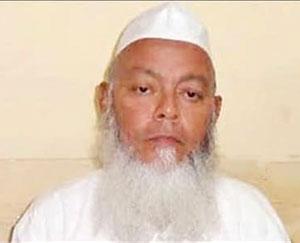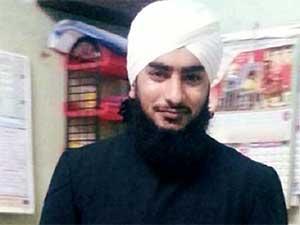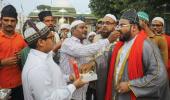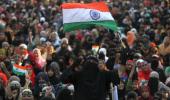'Why the restrictions for Bakri Eid?'
Jyoti Punwani reports.

Some were angry, some perturbed, but the predominant feeling among Mumbai's Ulema was one of puzzlement at the refusal of the Maharashtra government to allow any concessions for Bakri Eid.
The festival falls on July 31-August 1.
At a press conference held by the Joint Platform of Muslim Organisations and Ulema on Wednesday, July 29, speakers wondered why, despite assurances by Sharad Pawar, the senior most political leader in the Maharashtra government, the guidelines issued by the government a fortnight ago had not been amended.
Those guidelines ruled out any relaxation of lockdown norms for the community's second biggest religious occasion.
From ward wise goat mandis, the community's leaders have scaled down their demand to goat markets in Muslim mohallas only, so that people are not forced to travel to buy the animal, but this too has been rejected.
Asked how social distancing could be maintained at such mandis, the Ulema said that only one dealer and his assistant would be allowed at a time, and buyers too would queue up keeping social distancing in mind.
"After all, isn't sale of non-essentials being allowed," they asked.
Though the government has not disallowed the ritual qurbani, at toll nakas, the police are stopping vehicles carrying more than two goats. It is uneconomical to hire a tempo for just two goats, hence people pool in to transport at least 10.
Reports of goats falling sick as they remain inside vehicles stuck at toll nakas have been coming in.
"The government must compensate their owners," said Maulana Aijaz Kashmiri, "because it is the government's indecision that is leading to these animals falling ill and even dying. Since qurbani has been allowed, dealers are bringing goats. In fact, many of these goats have been ordered online as per the government's directive."
At a meeting held on July 1 with community representatives, the Maharashtra government okayed the qurbani, and promised to come up with detailed guidelines within a fortnight.
But what emerged was only a series of directives that said the festival should be celebrated in a simple manner and that no lockdown rules would be relaxed.
 IMAGE: Maulana Halimullah Qasmi
IMAGE: Maulana Halimullah QasmiMaulana Halimullah Qasmi of the Jamiat Ulema, pointed out that because of the assurance given at the beginning of July that qurbani of large animals could be done, people in Bhiwandi, a township near Mumbai, had already bought buffaloes. But the government has refused to allow the three-day sacrifice specially of large animals, that takes place at the Deonar abattoir in north east Mumbai.
"Where will these buffaloes be sacrificed?" asked Maulana Halimullah.
"Buffaloes are being slaughtered at Deonar every day," said Farid Shaikh of the Mumbai Aman Committee. "Why the restrictions for Bakri Eid?"
 IMAGE: Ejaz Kashmiri
IMAGE: Ejaz KashmiriKashmiri pointed out that the government could have thought of taking over large private slaughter houses for three days and allowing the qurbani of large animals to take place there.
"This government is just not serious about resolving our problem," he said.
Incidentally, the State's Muslim MLAs have met various ministers all through this month to get a clear directive on the way the occasion can be observed.
The Ulema felt that their political leaders may not have conveyed to the government the religious significance of the qurbani. "These leaders are all part of the government and they simply gave in," they grumbled.
A few speakers were angry at the way the community was being treated.
"Bakri Eid is just a day away, and there is so much confusion. People are angry. We don't want law and order problems so we are not going to the toll nakaS to argue with the cops. We know once the decision comes from the top, the cops will have to follow it," said Shaikh.
On July 14, Maharashtra Chief Minister ddhav Thackeray had asked Muslims to perform a 'symbolic qurbani'. "What exactly does a symbolic qurbani mean?" asked Maulana Abdus Salam Salafi of the Ahle Hadees.
Another maulana pointed out that they had followed the government's lockdown instructions all through, even during the month of Ramzan.
Masjids remained shut and Friday prayers were stopped; even the Eid namaz was not said collectively as is the practice.
"For all this, the Quran makes allowances," said Maulana Halimullah. "But there is no allowance made for qurbani. For those who can afford it, it is mandatory. It is only the Ulema who can convey this to the government."
Ironically, in BJP-ruled Gujarat and even in Yogi Adityanath's UP, qurbani was being permitted as long as the lockdown norms were kept in mind, said the speakers.
"The Maharashtra government claims to be secular," they added.
Feature Presentation: Aslam Hunani/Rediff.com










